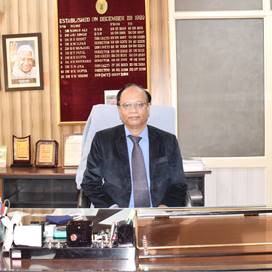
Dr. Nachiket Kotwaliwale
The ICAR – Central Institute of Post-Harvest Engineering and Technology (CIPHET), established in 1989 at Ludhiana, undertakes lead research in the area of the post-harvest engineering and value addition technologies appropriate to agricultural production catchments and agro-processing industries. The institute is also engaged in human resource and entrepreneurship development related to post-harvest operations performed on-farm as well as off-farm in order to minimize the post-harvest losses and empower the rural community with additional income. ICAR-Central Institute of Post-Harvest Engineering and Technology, Ministry of Agriculture and Farmers Welfare, Government of India has two All India Coordinated Research Projects (AICRP) namely, AICRP on Post-Harvest Engineering & Technology (PHET) and Plastic Engineering in Agricultural Structures and Environment Control (PEASEM) with 31 and 14 cooperating centres, respectively, located all over India. It is also the coordination unit of one Consortium Research Project (CRP) on Secondary Agriculture. ICAR-Central Institute of Post-Harvest Engineering and Technology, Ministry of Agriculture and Farmers Welfare, Government of India and its schemes are catering to all kinds of farm produce viz. cereals, pulses, oilseeds, fruits, vegetables, specialty crops and animal products.
The Institute has strong multidisciplinary scientific base with sufficient expertise in engineering and allied technology for carrying out research, providing technical services and knowledge services and generating relevant information for national level policies on post-harvest agriculture sector. The Institute at present is operating with five divisions, namely Food Grain & Oilseed Processing Division, Agricultural Structures & Environment Control Division, Automation and Sensor Technology Division and Transfer of Technology Division at Ludhiana and Horticultural Crop Processing Division regional station at Abohar. These divisions are equipped with appropriate laboratories and some state of the art instruments, equipment, pilot plants etc.
During past five years, ICAR-Central Institute of Post-Harvest Engineering and Technology, Ministry of Agriculture and Farmers Welfare, Government of India had undertaken projects of national importance such as determination of post-production losses of agricultural produce including food grains, fruits, vegetables, fish, milk, meat etc., submitted the report for storage losses in FCI, state and central warehouses and recommended norms for proper management during storage and also established a fumigation chamber for grapes and recommended operational norms/guidelines. The institute including its schemes has developed about 76 machinery / technologies/ process protocols that includes On-farm field dryers for paddy, solar dryer for perishable commodities (chilli, tomato, onion, turmeric etc.), improved storage structure for fruits and vegetables, cleaners, graders, shellers, peelers, decorticators, Makhana processing unit, protein isolate pilot plant etc. Seventy eight technologies were transferred to entrepreneurs. Establishment of Agricultural Processing Centres (130) has revolutionized the value addition and marketing of produce in production catchments, resulting in direct or indirect employment of farmers, youth and women transforming them into entrepreneurs. The scientific output of the institute can be enumerated as 198 peer reviewed research papers, eighteen granted patents and fifteen commercialized technologies, besides several presentations, lectures, popular articles, technical bulletins, etc.
While developing technologies there are several challenges which need to be addressed to, such as: lack of awareness among the conventional processors about quality and safety codes and standards resulting in relatively high cost and low quality of farm produce for processing; long and fragmented supply chain, tiny and fragmented holdings along with inferior agri-inputs, inappropriate variety, inefficient farm management and cost of logistics; high cost of power and inadequate or unreliable availability etc. that leads to huge post-harvest losses. On the other hand the technology that is available demands high investment, may not be in right size, may not suit to wide crop/ product and variety base of India and requires costly inputs. Thus there is demand for domestic and appropriate technology and machinery.
Automation of different operations is one of the most important engineering intervention in different fields of life. Generating information analysing the same, taking appropriate decisions and their actuation is very challenging yet important for accurate, safe and economic post-harvest operations. Sensors and computational protocol like artificial intelligence, communication over different modes, amalgamation of data coming from different sources and formats are the future priority alongwith development of machinery, technology, products and strategies to ensure nutritional security to customers and economical security to producers.









